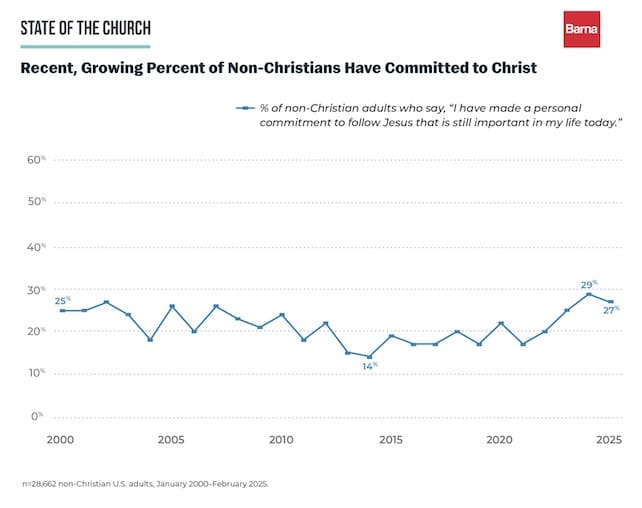Growth Among New Jesus Followers
Barna’s study compares findings in two similar but not identical survey questions: Christian self-identity and commitment to Jesus—that is, whether a person self-describes as Christian and whether a respondent indicates a commitment to Christ. Interestingly, responses to the two questions are not always in lock-step, reflecting that people are often a patchwork of religious beliefs and identities.
RELATED: Ex-Christians Aren’t the Only Ones Deconstructing Faith
In other words, some people identify as Christian and others express commitment to Jesus, but these groups don’t always overlap. Almost 3 in 10 people who don’t identify as Christian say they have made a personal commitment to Jesus. This number is currently near an all-time high. This may be due to a combination of people returning to their faith and new people becoming interested in Jesus, without identifying as Christian. Many people are now open to spirituality and Jesus, but hesitant to embrace organized religion or identify as Christian.
Kinnaman offers this explanation: “At this time, we are seeing interest in Jesus that is growing among those who do not otherwise describe themselves as Christians, indicating that many of the new followers of Jesus are not just ‘recycled’ believers. Along with younger generations coming to Jesus, this is another strong sign that interest in Jesus is brewing in new population segments of society.”
These findings echo Barna research revealed in the 2017 article, “Meet the Spiritual but Not Religious.” As in that study, today many people seem to be separating their spiritual openness from direct labels, suggesting they want to be affiliated with Jesus, but not with the Church or with Christianity as a religious identity—at least not yet.

What Does This Mean for Church Leaders?
For pastors and ministry leaders, this is a moment both to celebrate and to steward. People are open—perhaps as much as any time in recent memory—to Jesus. Churches that can meet people in this openness—with authenticity, humility and a focus on discipleship—may find fresh opportunities to minister.
“The increase in commitment to Jesus among those under 40 suggests a growing spirituality that is quiet, personal, unconventional and hopeful, but also challenging,” Kinnaman says. “That’s because today’s spiritual openness is unlikely to translate into church affiliation or attendance and may not resemble renewal movements of the past.
“Still, Christians should be encouraged to hold greater confidence in the gospel and to meet this significant opportunity by cultivating deep-rooted discipleship.”
Kinnaman also notes that answers about “why” the renewal is happening are more elusive.
“While social research can effectively track trends, it may not always identify the root causes behind them,” he says. “Still, the pandemic undeniably disrupted life for everyone, creating space for existential questions and the pursuit of meaning.
“As such, Barna has observed significant indicators of spiritual resurgence in initiatives like ‘The Open Generation,’ ‘Spiritually Open‘ and ‘Spiritually Curious‘ projects. Simultaneously, society is witnessing other substantial Jesus-centered endeavors. While Barna hasn’t specifically examined their influence, the extensive Jesus-focused media—including ‘The Chosen‘ and He Gets Us—and grassroots campus movements are noteworthy for their scale and concentration on young adults.
“As Christian leaders navigate this changing landscape, one thing is clear: Jesus is still attracting people—even those who have left the pews or never sat in them. The opportunity is not just to count commitments but to help shape people into lifelong disciples.”
About the Research
Barna Group’s tracking data is based on online and telephone interviews within nationwide random samples of 130,029 adults conducted over a twenty-five-year period ending in February 2025. These studies are conducted utilizing quota sampling for representation of all U.S. adults by age, gender, race / ethnicity, region, education and income. Minimal statistical weighting has been used when necessary to maximize statistical representativeness. Included in this data is 3,579 online interviews that were collected in January and February of 2025. These interviews were also conducted utilizing quota sampling for age, gender, race / ethnicity, region, education and income, and minimal statistical weighting has been used to maximize statistical representation.
Glossary:
- Gen Z: Born between 1999 and 2015
- Millennial: Born between 1984 and 1998
- Gen X: Born between 1965 and 1983
- Boomer: Born between 1946 and 1964
- Elder: Born before 1946
- Christians are self-identified Christians, including those who identify as Catholic, excluding those who identify as Mormon or Jehovah’s Witness.
- Non-Christians are U.S. adults who do not identify as Christian.

